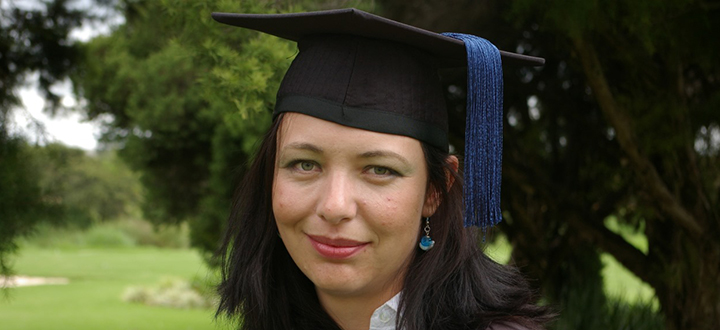News & Events
Unisan appointed chairperson of the NSFAS board
Dr Karen Stander, a senior lecturer in the Department of Business Management at Unisa’s College of Economic and Management Sciences (CEMS), has been appointed by the Minister of Higher Education, Dr Nobuhle Pamela Nkabane, as the non-executive member and chairperson of the National Student Financial Aid Scheme (NSFAS) board.

Dr Karen Stander
NSFAS is a government initiative that provides financial assistance to students from low-income families pursuing higher education at public universities and technical vocational education and training (TVET) colleges.
Stander expressed her deep honour and humility in taking on this important role, highlighting the immense responsibility that comes with shaping the future of many South African students. “It is a great privilege to contribute to the future of many South Africans through this role,” she said. “I draw strength from the writings of Zerubbabel, which remind us that before the final stone can be laid, the first one must be placed.”
Stander’s career in academia spans over 13 years, with her dedication to student empowerment through innovation and entrepreneurship driving her success. Holding a PhD in Business Management from the University of Pretoria, her vast qualifications and experience make her an ideal candidate to lead the NSFAS board. Throughout her career, Stander has won multiple accolades, including the 2019 CEMS Community Engagement Award, the 2020 Unisa Teaching and Learning Award, and the 2023 EDHE Entrepreneurship in Higher Education Award (second place).
Beyond her professional achievements, Stander credits her personal inspirations as key to her resilience and perseverance. She draws strength from her grandmother, who overcame immense adversity after World War II, and her mother, whose unwavering support and work ethic have had a lasting influence on her. Her cousin, who faced the tragic loss of her husband and child, is also a source of inspiration for her determination to rebuild and move forward.
Her journey has been further guided by mentors such as Professor Nthabiseng Moraka, director of the School of Management Sciences at Unisa, and Professor Marcia Mkansi, who has helped bring Stander’s out-of-the-box ideas to life. “Each of these role models has instilled in me the values of perseverance, resilience, and unwavering faith – lessons that continue to shape my journey,” she reflected.
Stander envisions a thriving entrepreneurial ecosystem in South Africa, empowering students to innovate and become job creators rather than job seekers. She is passionate about seeing the new Sustainability Sciences degrees she has worked on come to fruition, helping graduates make a global impact.
For those aspiring to follow in her footsteps, Stander advises putting oneself first – not out of selfishness, but as a necessity. She concludes: “Ensure that you are healthy, physically, emotionally, and spiritually. Lay your foundation with integrity, resilience, and purpose, and you will be ready to step up to the challenges of leadership.”
* By Tebogo Mahlaela, Communication and Marketing Specialist, College of Economic and Management Sciences
Publish date: 2025/02/18
